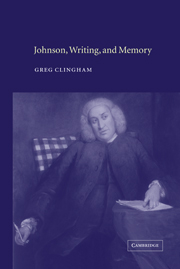Book contents
- Frontmatter
- Contents
- Acknowledgments
- List of abbreviations
- Introduction: Johnson and authority
- 1 Johnson and memory
- 2 Johnson and nature
- 3 Law, narrative, and memory
- 4 Narrative, history, and memory in the Lives of the Poets
- 5 Translation and memory in the Lives of the Poets
- 6 Historiographical implications
- Notes
- Bibliography
- Index
1 - Johnson and memory
Published online by Cambridge University Press: 22 September 2009
- Frontmatter
- Contents
- Acknowledgments
- List of abbreviations
- Introduction: Johnson and authority
- 1 Johnson and memory
- 2 Johnson and nature
- 3 Law, narrative, and memory
- 4 Narrative, history, and memory in the Lives of the Poets
- 5 Translation and memory in the Lives of the Poets
- 6 Historiographical implications
- Notes
- Bibliography
- Index
Summary
By all accounts Johnson had an extraordinary memory. Boswell remarks on his “almost incredible” powers of memory as a small child, and Edmund Hector observed that as early as his school days Johnson's “memory [was] so tenacious, that whatever he read or heard he never forgot.” All of Johnson's contemporary biographers have stories about this strength of memory, and the precise terms of their commemoration deserve notice. The most commonly remarked on feature is Johnson's ability to retain in his mind over a period of time almost anything he had once heard or read. This form of memory corresponds to Johnson's first definition in the Dictionary: “the power of retaining or recollecting things past; retention; reminiscence; recollection.” The quotation from Locke offered to illustrate this definition, however, immediately problematizes the notion of memory as mere retention. As part of a larger argument about personal identity, to which I turn below, Locke's quotation proposes that “Memory is the power to revive again in our minds those ideas which after imprinting have disappeared, or have been laid out of sight.” This introduces the paradoxical notion that the memory is able to retain ideas which are actually absent from the mind – either because they have “disappeared” or “been laid out of sight.” This introduces the paradoxical notion that the memory is able to retain ideas which are actually absent from the mind – either because they have “disappeared” or “been laid out of sight.”
- Type
- Chapter
- Information
- Johnson, Writing, and Memory , pp. 14 - 35Publisher: Cambridge University PressPrint publication year: 2002



